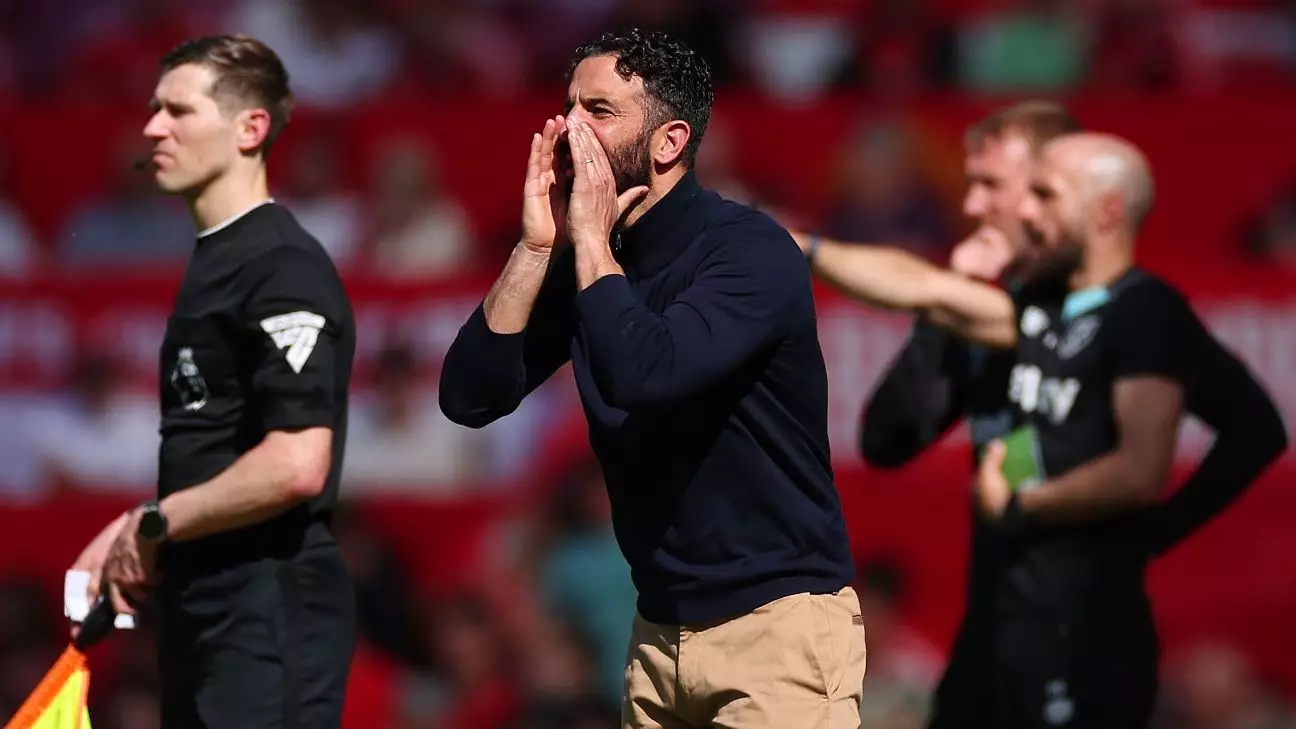The echoes of Manchester United’s storied past are fading, and manager Ruben Amorim is acutely aware of the palpable weight of this reality. In the wake of yet another disheartening loss—this time a 2-0 defeat to West Ham at Old Trafford—Amorim’s post-match reflections were laced with a stark blend of embarrassment and frustration. The club finds itself languishing in 16th place in the Premier League, an unfathomable position for an institution with such towering ambitions and a rich history.
Amorim’s palpable disappointment reveals the depths of the crisis facing the club. “Embarrassed and it’s hard to accept,” he reflected during a post-match news conference that echoed with the seriousness of a manager conversing on the brink of a precipice. The highly respected football icon recognized the urgency for transformation but is painfully aware that rapid changes need to be both swift and effective to avoid a potential managerial exit before the season ends.
A Culture of Complacency: The Underlying Issues
At the heart of Amorim’s concerns lies a troubling atmosphere within the squad, one he characterized not strictly as a culture issue but as an unsettling “feeling” among players. This intangible sentiment—perceived complacency and a lack of urgency—poses the most significant risk for a club like Manchester United, traditionally built on a foundation of relentless ambition and a winning mentality. When a manager expresses worries about the emotional state of his team, it’s a clarion call for introspection, and perhaps for the players, a wake-up call.
Amorim’s admission that the players seem desensitized to the club’s current tribulations is alarming. In his own words, he highlighted, “the feeling that it’s okay” to be underperforming is, in fact, the club’s most dangerous enemy. Such a mentality is not just a blip on the radar; it’s a harbinger of a more profound problem that has seeped into the floors of Old Trafford.
A Need for Courageous Change
With only six Premier League victories collected under Amorim’s stewardship since his appointment in November, the task ahead feels monumental. His unwavering commitment to the club, displayed through his willingness to acknowledge personal responsibility, further underscores the urgency for transformation. “We need to be really strong in the summer and be brave,” he emphasized, hinting at the need for a robust shake-up in both the squad and the management approach as the club prepares for an uncertain future.
Yet, how does a club steeped in tradition address such profound issues? Amorim’s suggestion that the club may not be ready for a return to Europe’s elite level of competition speaks volumes. The combination of a trophy opportunity in the Europa League alongside pressing league concerns renders his position precarious, with mounting pressure to deliver results immediately.
Expectation versus Reality: The Club’s Identity Crisis
True to form, Manchester United finds itself engulfed in an identity crisis. Once synonymous with Champions League football, the club now faces the dire prospect of settling for mediocrity if the prevailing attitudes and performances do not change. “We are showing in the end of the season that playing in the Premier League and Champions League for us is the moon,” Amorim lamented. This stark commentary is both a reflection and an indictment of the crevices that have emerged in the club’s once-lauded culture.
The spotlight now beams brightly on Amorim, a proven tactician who once led his former club to great heights but who now stands on shifting ground. Each decision carries immense weight as he strives not only to salvage the season but also to restore a legendary club to its rightful place among the football elite. United’s next games, particularly the imminent clash against Chelsea followed by the pivotal Europa League final, become not only a test of strategy but also of resolve—both his and the players’.
As fans hold their breath in anticipation, the mounting pressure on Amorim is palpable; the time for change is not on the horizon but demands immediate action. Will he rise to meet the challenge and rekindle the fire inherent in Manchester United’s legacy, or will the flames of complacency continue to smolder, casting a shadow over the club’s gilded history? The answer may not only dictate the trajectory of his managerial career but also the future of a club lost in its own grandeur.


Leave a Reply